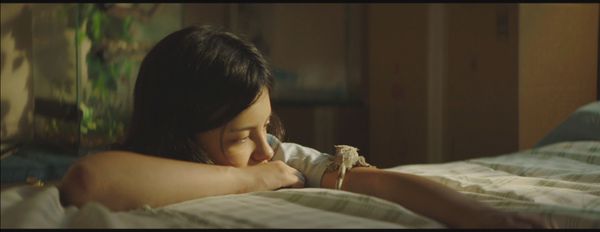Eye For Film >> Movies >> Picture Day (2022) Film Review
Picture Day
Reviewed by: Jennie Kermode

Set around the day when photographs of children are taken at school, Kelly Pike’s Oscar-qualifying short film is a snapshot of an army kid who has just been subjected to yet another move as her parents’ marriage crumbles and she begins to assert her own identity. Anchored by a soulful performance from Oona Yaffe as the troubled Casey, it’s a film that addresses issues many viewers will have experienced themselves, yet does so with a specificity that will make it difficult to forget.
Casey likes butterflies. They’re a commonplace metaphor for coming of age, but Casey likes to collect them when they’re dead. With great care and precision, she pins them to a board which tells us, at a glance, all the places she has lived. Here, her new school presents what seem like familiar problems. Within moments of taking her seat she has been pinged a note which asks if she’s a boy or a girl. The other kids laugh. She is stoic, but later, in the toilets, she watches through a crack in the door as other girls coo at each other over a pair of new earrings. Wanting to get her own ears pierced will become a major point of conflict with her mother, who is also unhappy about her unstyled hair. Caught in that awkward place between child and adult, she struggles to establish her own direction.

Making a short film requires compact storytelling and Pike delivers a great deal in just 16 minutes. We see not just Casey’s frustration but also that of her mother (Michelle Krusiec), who feels attacked from both sides as her husband, trying to find a compromise, casually undermines her authority. His habit of suddenly raising his voice to make sure he gets his way, and her shudder in response to it, speaks volumes. She asks him about a retirement option he previously discussed, and we see her awful loneliness and his complete failure to notice or care. He mocks her ability to support the family whilst effectively denying her the chance to complete a degree. We see warmth in him as he deals with his daughter but one wonders if that will last should she begin to challenge him too.
It’s not all grim. There’s comedy to be found in the family dynamic – especially in Casey’s interactions with her older brother, whose hair, clothes and manner suggest that no-one is attempting to exercise much control over his development. The question on that classroom note, which appeared thoughtless and trivial, keeps returning as we see the destiny that gendered expectations are pushing Casey towards. The school picture is a perfect frame, always more about other people, and what they want to see, than about the child. The days of free and honest expression are over in a flash.
Reviewed on: 28 Oct 2024














